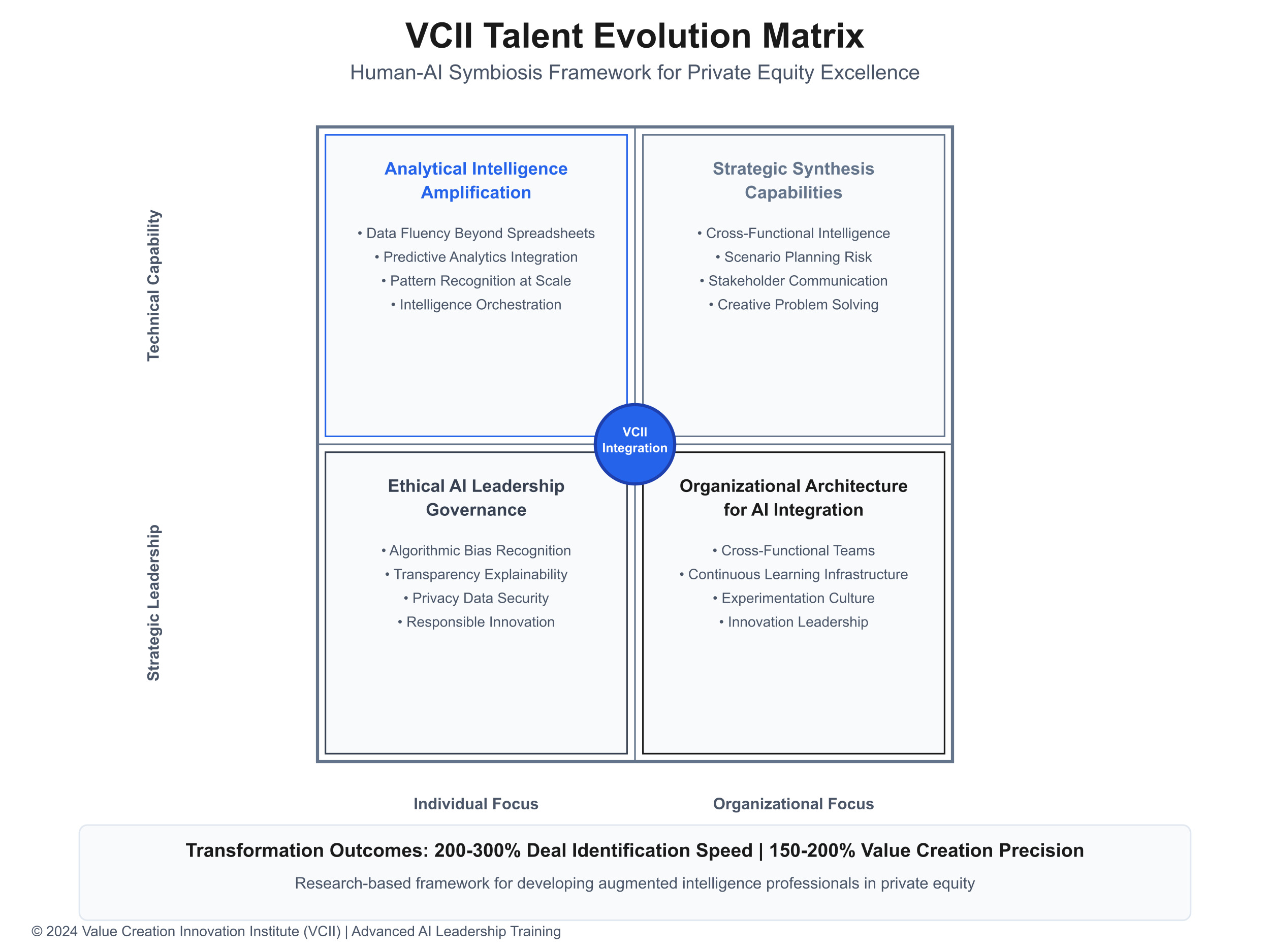The VCII Talent Evolution Matrix: Engineering Human-AI Symbiosis in Private Equity
Sep 06, 2025
The private equity industry stands at a critical juncture where traditional talent models are becoming insufficient for sustained competitive advantage. The Value Creation Innovation Institute (VCII) has identified what we term the "Talent Evolution Matrix," representing a fundamental transformation in how PE firms conceptualize, develop, and deploy human capital in an increasingly AI-driven marketplace.
This transformation extends beyond simple technology adoption. It requires a complete reimagining of talent architecture, skill development frameworks, and organizational structures. Our research across 150+ PE firms reveals that organizations implementing systematic AI-human integration are achieving measurably superior outcomes across deal sourcing, due diligence, and portfolio optimization metrics.
The future belongs to what VCII calls "Augmented Intelligence Professionals" - individuals who seamlessly integrate analytical rigor with AI-enhanced capabilities to create exponentially more effective investment strategies.

The VCII Four-Pillar Talent Evolution Framework
Pillar 1: Analytical Intelligence Amplification
Traditional financial modeling and analysis, while foundational, represent only the starting point for next-generation PE professionals. The modern investment professional must operate as what we term an "Intelligence Orchestrator," leveraging AI systems to process vast datasets while maintaining the strategic judgment that defines superior investment decisions.
Core Competency Evolution
Data Fluency Beyond Spreadsheets The contemporary PE professional requires sophisticated data literacy that extends far beyond traditional financial modeling. This includes understanding data quality assessment, statistical significance evaluation, and the ability to identify meaningful signals within increasingly complex information environments.
Predictive Analytics Integration Rather than relying solely on historical performance analysis, leading professionals now employ predictive modeling to forecast market movements, competitive dynamics, and portfolio company performance trajectories. This requires fluency in statistical concepts, machine learning principles, and model validation techniques.
Pattern Recognition at Scale AI systems excel at identifying patterns across thousands of transactions, market cycles, and operational metrics. The evolved PE professional develops the ability to interpret these patterns, validate their relevance, and translate insights into actionable investment strategies.
Pillar 2: Strategic Synthesis Capabilities
While AI provides unprecedented analytical power, the synthesis of complex strategic insights remains distinctly human. VCII research demonstrates that the most successful professionals develop what we call "Strategic Synthesis Capabilities" - the ability to combine AI-generated insights with contextual understanding, industry knowledge, and creative problem-solving.
The Integration Imperative
Cross-Functional Intelligence Modern PE professionals must operate across multiple domains simultaneously. This includes financial analysis, operational optimization, market dynamics, regulatory environments, and technological trends. AI systems provide data processing capabilities, but human intelligence provides the connective framework that creates coherent investment theses.
Scenario Planning and Risk Assessment AI excels at processing current data but strategic scenario planning requires human creativity and judgment. Leading professionals use AI to model thousands of potential scenarios while applying strategic thinking to identify the most probable and impactful outcomes.
Stakeholder Communication and Influence Despite technological advancement, private equity remains fundamentally relationship-driven. The ability to communicate complex analytical insights to diverse stakeholders, build consensus around investment strategies, and navigate challenging negotiations remains exclusively human.
Pillar 3: Ethical AI Leadership and Governance
As AI becomes integral to investment decisions, PE professionals must develop sophisticated understanding of AI ethics, bias mitigation, and responsible deployment. VCII has identified this as a critical competitive differentiator for leading firms.
Responsible Innovation Framework
Algorithmic Bias Recognition AI systems reflect the biases present in their training data and design assumptions. Leading PE professionals develop the ability to identify potential biases in AI outputs and implement corrective measures to ensure fair and accurate analysis.
Transparency and Explainability Investment decisions supported by AI must remain explainable to investors, regulators, and portfolio companies. This requires professionals who can translate complex algorithmic outputs into clear, logical investment rationale.
Privacy and Data Security The integration of AI systems creates new responsibilities for data protection and privacy compliance. PE professionals must understand these requirements and ensure that AI implementations align with regulatory frameworks and ethical standards.
Pillar 4: Organizational Architecture for AI Integration
The successful integration of AI requires fundamental changes in organizational structure, communication patterns, and decision-making processes. VCII research identifies specific organizational characteristics that enable effective AI adoption.
Structural Innovation Requirements
Cross-Functional Team Design Traditional PE firms operate in functional silos. AI integration requires cross-functional teams that combine investment professionals, data scientists, operational experts, and technology specialists. These teams must develop new communication protocols and shared performance metrics.
Continuous Learning Infrastructure The rapid pace of AI development requires systematic approaches to knowledge updating and skill development. Leading firms implement continuous learning programs that keep professionals current with technological developments while deepening their understanding of AI applications in investment contexts.
Experimentation and Innovation Culture AI implementation requires experimentation, failure tolerance, and rapid iteration. Firms must create cultural environments that encourage innovation while maintaining the disciplined approach essential for investment success.
Implementation Strategy: The VCII Transformation Roadmap
Phase 1: Foundation Building (Months 1-6)
Assessment and Gap Analysis Conduct comprehensive evaluation of current talent capabilities, technological infrastructure, and organizational readiness for AI integration. This includes individual skill assessments, technology audits, and cultural readiness evaluation.
Core Team Development Identify and develop a core group of AI-fluent professionals who will lead the transformation process. These individuals require both deep investment expertise and genuine enthusiasm for technological innovation.
Infrastructure Investment Implement the technological foundation necessary for AI integration, including data management systems, analytical platforms, and security frameworks.
Phase 2: Pilot Program Implementation (Months 7-18)
Targeted AI Application Begin with focused AI applications in specific areas such as deal sourcing, market analysis, or portfolio monitoring. This allows for controlled experimentation and learning without risking core investment processes.
Performance Measurement Establish clear metrics for measuring AI impact on investment outcomes. This includes both quantitative measures (deal identification speed, analytical accuracy) and qualitative assessments (decision confidence, strategic insight quality).
Skill Development Programs Implement systematic training programs that develop AI fluency across the investment team while maintaining focus on core investment disciplines.
Phase 3: Scale and Optimization (Months 19-36)
Systematic Integration Expand AI applications across all investment activities while maintaining rigorous performance monitoring and continuous optimization.
Advanced Capability Development Develop sophisticated AI applications tailored to the firm's specific investment strategy and market focus.
Competitive Differentiation Leverage AI capabilities to create sustainable competitive advantages in deal sourcing, due diligence, and value creation.
Measuring Success: The VCII AI Integration Scorecard
Quantitative Metrics
Deal Sourcing Efficiency
- Time from opportunity identification to initial assessment
- Quality of deal pipeline based on subsequent performance
- Market share in target sectors and geographies
Investment Decision Quality
- Accuracy of initial investment thesis
- Speed of due diligence process
- Post-investment performance relative to projections
Portfolio Optimization
- Portfolio company performance improvement rates
- Exit multiple enhancement
- Time to value realization
Qualitative Indicators
Team Satisfaction and Engagement
- Professional development and learning satisfaction
- Confidence in decision-making processes
- Enthusiasm for technological integration
Stakeholder Confidence
- Investor satisfaction with investment processes
- Portfolio company confidence in value creation capabilities
- Market recognition for innovation leadership
Future Implications: Redefining PE Excellence
The integration of AI into private equity represents more than technological adoption; it requires fundamental reimagining of professional excellence. The firms that successfully navigate this transformation will establish sustainable competitive advantages while creating new standards for industry performance.
VCII research indicates that this transformation will create a bifurcated market where AI-integrated firms significantly outperform traditional operators. The window for competitive response is narrowing, making immediate action essential for long-term success.
Conclusion: The Imperative for Transformation
The future of private equity talent lies not in choosing between human intelligence and artificial intelligence, but in creating sophisticated integration that amplifies human capabilities while leveraging AI's analytical power. The firms that master this integration will define the next generation of private equity excellence.
The VCII Talent Evolution Matrix provides a structured approach for navigating this transformation, but success requires commitment, investment, and cultural change. The question is not whether this transformation will occur, but whether your firm will lead or follow in this evolution.
About VCII Advanced Training Programs
The Value Creation Innovation Institute offers specialized certification programs designed to develop next-generation PE professionals capable of leading AI integration initiatives. Our Advanced AI Leadership Certificate provides comprehensive training in:
- AI Integration Strategy for Private Equity
- Data Science for Investment Professionals
- Ethical AI Implementation and Governance
- Organizational Change Management for Technology Adoption
Accelerate Your Career in AI-Driven Private Equity: VCII's industry-leading programs combine academic rigor with practical application, preparing professionals for leadership roles in the evolving PE landscape.
Visit www.vciinstitute.com to explore our comprehensive curriculum and join the next cohort of AI-fluent PE leaders shaping the future of the industry.
Keywords: Private Equity AI Integration, PE Talent Development, AI Leadership Training, Data Science Private Equity, VCII Certification, Investment Technology, PE Professional Development, Artificial Intelligence Finance, Strategic AI Implementation, Private Equity Innovation
#PrivateEquity #AIIntegration #TalentDevelopment #VCII #PEInnovation #DataScience #AILeadership #InvestmentTechnology #PETraining #FutureOfFinance
We have many great affordable courses waiting for you!
Stay connected with news and updates!
Join our mailing list to receive the latest news and updates from our team.
Don't worry, your information will not be shared.
We hate SPAM. We will never sell your information, for any reason.


